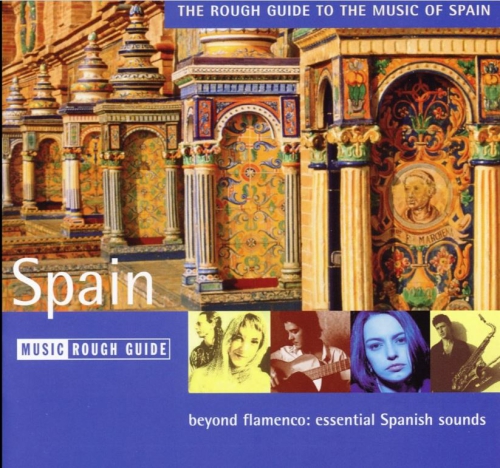Subtitled "Infectious Beats From the Spanish Streets," this is a collection of newer, often younger artists, mostly acoustic performers, who are all of, and frequently working in, the traditional and regional styles of Spain. There's plenty of Andalusian influence here, right from Javier Ruibál's opening track into Javier Paxarino's Arabic-inflected "Amanecer el la Sabika," but that's hardly all. Galicia is represented by Anubía, while the wonderful Hiru Truku and "Neska Soldadua" raise the Basque flag. In between there's a very fair selection of what's going on in Spain, whether it's the flamenco of Diego Carrasco or the political Catalan song of María del Mar Bonet. At its heart, as the compilers note, a lot of this might be classified as pop music (though not in the more American sense), but still very rooted. Notably, some experimental performers, such as Mercedes Peon and those working in a straight folk form (like Susana Seivane), aren't here, but that's fine; this gives exposure to many lesser-known talents, all of whom deserve it. A strong look at a part of Spain that hasn't received enough international sun -- yet. by Chris Nickson
Tracklist:
1 Javier Ruibal – Isla Mujeres 4:47
2 Javier Paxariño – Amanecer En La Sabika 7:16
3 Companyia Elèctrica Dharma – Poble Romani 3:15
4 Luis Delgado – El Hechizo De Babilonia 4:16
5 La Sal De La Vida – Fibali 3:15
6 Maria Salgado – Siete Modo De Guisar Las Berenjenas 4:10
7 Rafael Riqueni – Al Nino Miguel 3:06
8 Maria Del Mar Bonet – Merce 4:19
9 José Antonio Ramos With Pancho Amat – De Isla A Isla 3:45
10 Diego Carrasco – Yo, Marinero 4:40
11 Ronda Segoviana – Seguidillas 2:42
12 A Falta De Pan – Mirabras 4:00
13 Hiru Truku – Neska Soldadua 3:57
14 Anubía – Cantarea 1:05
15 La Chirigota Del Selu – !Arrempuja!, Que Ya Estamos Aqui Las Marujas 2:32
16 Jorge Pardo – Jeta 6:16
Mostrando postagens com marcador Contemporary Flamenco. Mostrar todas as postagens
Mostrando postagens com marcador Contemporary Flamenco. Mostrar todas as postagens
22.2.21
V.A. - The Rough Guide To The Music Of Spain (2002) Mp3
29.2.20
PACO DE LUCÍA / AL DI MEOLA / JOHN MCLAUGHLIN - The Guitar Trio (1996) FLAC (image+.cue), lossless

The acoustic guitar trio of John McLaughlin, Al DiMeola, and Paco DeLucia can always be relied upon to create quiet but fiery music. The three virtuosos always sound restrained and tasteful (yet inwardly explosive) when they play together. This 1996 effort has three originals apiece from McLaughlin and DiMeola, two by DeLucia and a beautiful McLaughlin-DiMeola duet on "Manha de Carnaval" that makes one wish they would more fully explore bossa nova. Most of the selections are thoughtful, but there are also plenty of explosive outbursts for contrast (along with the jubilant closer "Cardeosa") on the highly arranged yet spontaneous-sounding program. by Scott Yanow

Assinar:
Comentários (Atom)
+ last month
MARTHA COPELAND — Complete Recorded Works In Chronological Order Volume 2 · 1927-1928 + IRENE SCRUGGS — The Remaining Titles 1926-1930 | DOCD-5373 (1995) FLAC (tracks+.cue), lossless
One of many early blues and jazz women who were overshadowed and ultimately eclipsed by Ma Rainey, Ethel Waters, and Bessie Smith, Martha Co...







.jpg)
.jpg)



